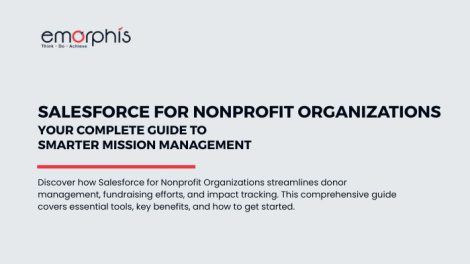Overview
As per the data, the Global Financial Services Cloud market was valued at US$ 27.13 billion in 2021. It is predicted to reach US$ 91.67 billion by 2027. According to a survey, financial institutions are planning to increase their technology spending by more than 10 percent in 2023. This shows that financial institutions are going to put major emphasis on advanced technology. It has also been identified that financial companies are giving major priority to customer experience.
The pandemic has affected the operations of asset management, financial service organizations, capital markets, insurance, and many more. what is being done by financial service companies to deal with these situations? We will find out soon! As per Deloitte, the financial service industry has been using smart strategies and focusing on technology, talent, risk, and regulations. It has been identified that the financial service industry understands that financial services cloud solutions help to reduce costs, give real-time access to updated data, boost operational efficiency, and many more. All these benefits indicate why the financial service industry is moving to the cloud.

Future Technolgy Trends for Financial Services
Innovative new technologies have been redefining the financial sector and shaping the services so that consumers can get high-quality services. Banks, insurance companies, NBFCs, asset management companies, and others have been actively investing in technology in order to offer high-quality services and understand consumer preferences. Let's have a look at some of the financial service trends in the future.
1. Artificial intelligence
As per research, the global artificial intelligence in banking market size was valued at US$ 3.88 billion in 2020. It is predicted to reach US$ 64.03 billion by 2030. It has been identified that artificial intelligence brings the benefit of digitalization which helps financial institutions to deal with the competition. As per Forbes, 54 percent of financial service organizations have adopted artificial intelligence. With the help of artificial intelligence financial institutions can manage huge amounts of data in the most effective manner. In addition, it allows financial service providers to customize the services which in turn increases customer engagement. It has also been identified that artificial intelligence saves banks from fraud and security issues.
We can say that artificial intelligence offers a number of benefits to financial institutions. But it is important to note that there is a huge number of financial service cloud solution providers that can automate your services. As per our experience, we suggest you connect with a credible financial service cloud provider to get all the advantages.
2. Low-Code, No-Code Solutions
Another trend is the low code, no code solutions. As a matter of fact, low and no-code solutions allow financial service providers to quickly introduce new features. As per Gartner, the low code, no code market is to grow 20 percent in 2023. These solutions have become highly beneficial for small organizations as they do not find or retain excellent technical talent. Due to this reason, a number of organizations have been considering low code no code solutions. By using this solution financial service providers can deal with technological changes, fulfill customer demands, and offer high-quality services within no time.
Hence, this could become a necessary tool for organizations that wants to save cost, deal with challenges, or give more emphasis on product security. Low code no code solutions have become highly popular because of the benefits it offers like cost reduction, enhanced innovation, improve data security as well as operations, and many more.
3. Adoption of cloud
Banks and other financial institutions are constantly facing pressure due to find ways to increase operational efficiency and reduce costs. As per the data, more financial institutions will move their workloads to the cloud. The reason is that the financial sector requires a higher level of fault tolerance, data protection, and disaster recovery. On the other hand, banks, insurance companies, NBFCs, assets management companies, and others try to respond quickly to regulatory changes and fulfill customer demands. In order to fulfill all these agendas these organizations must have access to advanced technology. It has also been identified that cloud implementation has proved to be very useful at the time of covid19.
However, the migration to cloud-based infrastructure is not an easy decision and requires extensive planning. In order to reap all the benefits, you have to hire an experienced fintech software development services company that can design high-quality financial services cloud solutions.
4. Tools other than CRMs
Personalization and shift in demographics are other new trends for financial institutions. After the pandemic consumers want banks to offer high-quality and right products and services. To provide these services financial institutions must have access to the right data. Furthermore, the existing CRM tools do not offer this kind of information. As a result, financial service institutions are trying to find sales engagement platforms that can offer relevant information within no time.
The financial services industry has a wide range of tools available to help them with various aspects of their operations, including:
a. Financial planning and analysis tools
These tools help financial institutions to analyze and forecast their financial performance, create budgets and financial plans, and monitor key performance indicators. Examples of financial planning and analysis tools include Adaptive Insights, Anaplan, and Planful.
b. Trading and investment tools
These tools help traders and investors to make informed decisions about buying and selling assets. They provide real-time market data, analytics, and trading platforms. Examples of trading and investment tools include Bloomberg Terminal, Thomson Reuters Eikon, and Interactive Brokers.
c. Risk management tools
These tools help financial institutions to identify, assess, and manage risks across various aspects of their operations, including credit risk, market risk, and operational risk. Examples of risk management tools include RiskMetrics, SAS Risk Management, and KPMG Risk Intelligence.
d. Compliance and regulatory tools
These tools help financial institutions to comply with various regulatory requirements, such as anti-money laundering (AML) regulations, Know Your Customer (KYC) requirements, and data privacy regulations. Examples of compliance and regulatory tools include ComplyAdvantage, Fenergo, and Quantexa.
e. Accounting and bookkeeping tools
These tools help financial institutions to manage their accounting and bookkeeping tasks, such as invoicing, payment processing, and financial reporting. Examples of accounting and bookkeeping tools include QuickBooks, Xero, and Sage.
f. Customer engagement and experience tools
These tools help financial institutions to improve customer engagement and experience by providing personalized services, automated support, and self-service options. Examples of customer engagement and experience tools include Salesforce, HubSpot, and Zendesk.
Technology Adaptation in Financial Services
In today's environment, financial service providers are witnessing new demands from consumers. They need to invest in new tools and technology to offer the right products and services and capture more market share. In addition, cost and efforts to migrate to the cloud have become a major concern for traditional banks.
Financial institutions and leaders must understand what are the main priorities in order to deal with various challenges. As a matter of fact, omnichannel engagement makes sure that customers enjoy a seamless experience across channels. If you build an omnichannel then your customer can access your products and services from anywhere and anytime.
Another point is to note that financial services companies have to utilize the tools to get the right information about the consumer. Hence, it's important to invest in the right tools and technologies to increase customer satisfaction and offer excellent services. All these points must be on your priority list to engage with the consumers in the long run.
Now, let's look at one of the trends which do help the financial services industry players in all aspects.
Salesforce Financial Services Cloud
Salesforce Financial Services Cloud is a specialized CRM (customer relationship management) solution designed specifically for financial institutions. It provides financial advisors, bankers, and wealth managers with a 360-degree view of their client's financial data, enabling them to better understand their client's needs and provide personalized recommendations.

Financial Services Cloud includes features such as account management, financial planning tools, portfolio management, and compliance monitoring. It also integrates with other Salesforce products, such as Marketing Cloud and Sales Cloud, to provide a comprehensive solution for financial institutions.
One of the key benefits of the Financial Services Cloud is its ability to automate processes and workflows, reducing the time and effort required for manual tasks. It also provides robust reporting and analytics capabilities, enabling financial institutions to gain insights into their business and make data-driven decisions.
Salesforce Financial Services Cloud helps financial institutions build stronger relationships with their clients, increase productivity, and grow their businesses.
We advise you to check all the features and functions of the Salesforce Financial Services Cloud. As per our experience, Salesforce Financial Services Cloud is one of the top financial clouds that can help you attain a competitive advantage.
To know more about the Salesforce Financial Cloud, you can click on the link for more details about Salesforce Financial Services Cloud
Conclusion
The above information highlighted the importance of the financial services cloud. We also looked that financial service organizations must put emphasis on the right tools and technologies, and understand consumer preferences to offer high-quality services. We have also identified that the right financial services cloud provider can guide you in the right direction. With the help of a credible and highly experienced financial services cloud provider, you can get all the advantages and attain desired results within no time.
As we are talking about a highly experienced financial service cloud provider, we suggest you connect with Emorphis Technologies. Connect with us for Salesforce expert guidance in leveraging Salesforce's capabilities.

With the help of our experienced Salesforce developers, businesses can design and deploy high-quality products that meet their customers' needs. These developers can provide a range of services, from Salesforce consulting services that assess your business needs to Salesforce implementation services that get your organization up and running quickly. Additionally, Salesforce app development services can create custom apps that fit your unique requirements and help you achieve your business goals. So, if you want to improve your customer experience and increase your revenue, consider partnering with a reputable Salesforce development team.
You can connect with us to offer exceptional customer experience and attain competitive advantage most virtually.








